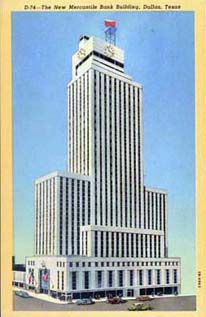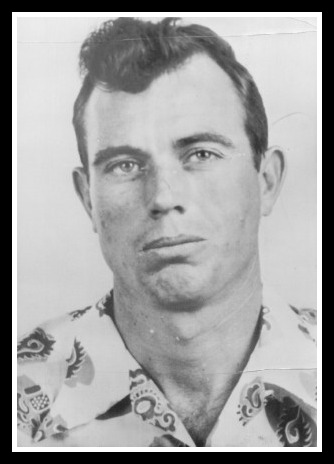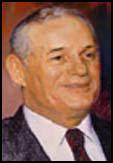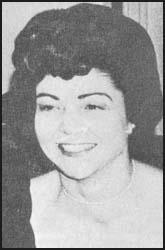This is part 2 of the interview with John Curington. See Billionaire Logic and the Death of JFK for the introduction and background this series. (Greg Doudna has posted a link to the full interview on his academia.edu page.)
It is interesting to compare today’s events with “fake news” and its correlation with criminal violence.
~ ~ ~
GD: So then we come to—Kennedy is assassinated.

JC: Yeah. At the time Kennedy came to Dallas in November ’63, our offices—when I say our I mean Hunt Oil company offices—were in the Mercantile Bank Building there in Dallas. And the Mercantile Bank Building had windows that were about four by six foot in dimensions, and you could raise them up and be exposed without a screen or anything. And when the Kennedy caravan passed our offices on the day of the assassination, Mr. Hunt and I were in the window looking out, and John Connally was in the front seat of the limousine in which Kennedy was a passenger. He turned up and looked at our building and recognized Mr. Hunt, and he turned around and made a comment to Jack Kennedy. And Kennedy in turn turned up and waved to Mr. Hunt there. So I think there was a recognition of Mr. Hunt on the parade route looking out his office window and being recognized by both John Connally and John Fitzgerald Kennedy there.
GD: You were standing right there with Mr. Hunt?
JC: Yeah, he and I were—in fact I’ve seen one clip, that I can recognize myself in that window and Mr. Hunt is standing by me there. But it has to be <unintelligible> personal recognition, which was more of an important issue there.
He and I were looking at—then I received a telephone call, I would say within three or four minutes of the shooting. And the person that called me stated that they had just heard that there had been a shot fired at John Kennedy. And I told that person that was impossible, because I had just seen him pass the window three or four minutes before, and that was impossible. But I had a TV in my office, and I did go over to my office and turn the TV on. And after a few minutes there was an interruption in the program, and it, the interruption, stated that yes there had a been a shot fired, and they at that time did not know where the shot was fired, who was hit, or what was involved with it, but as the story unraveled it became clear that yes, Kennedy had been shot, and yes, it was a fatal shot.
GD: Do you recall Mr. Hunt’s reaction to the news?
JC: I don’t think there was any visible reaction. He shared the same view that I did. He did not have a TV in his office. But after the program began to get interrupted with the story, then Mr. Hunt did come into my office and did sit down in a chair and watch the news. But I don’t remember him making any comment one way or the other, as to what was happening or not happening.
GD: But you said he did not make comments very much on things—
JC: No, no.

GD: Then—Officer Tippit was shot, and Lee Harvey Oswald was arrested in the movie theatre, and this was on a Friday afternoon—
(J. D. Tippitt, 1924-1963, was a Dallas police officer who was shot to death in another part of the city an hour after the Kennedy assassination, by an assailant described as matching Oswald’s description near to and immediately prior to Oswald’s arrest in a movie theatre.)
JC: Yes.
GD: And then the Dallas police—he was being questioned by Captain Fritz—
JC: Yeah. Will Fritz, he was Captain, head of the Homicide Division of the Dallas Police Department.
GD: Did you know Captain Fritz?
JC: Yes. I knew him, was on a first-name basis with him.
GD: Did you know others in the police department pretty well?

JC: Well, I guess my best contact, we tried to keep pretty good contact with all the law enforcement people, but I guess my best contact would have been Lieutenant George Butler. He was a frequent visitor to our office, and I was able to do some things for George Butler that he was appreciative of me being able to do, that—nothing illegal or unethical about it—but we just developed a pretty close working relationship. And I was able to call upon him for information, or his assistance on anything that I needed a little help on.
(“A friend of the late H. L. Hunt, Butler was a confidante of the famed oil tycoon and handled personal investigative assignments for Hunt Oil.”8 Butler is said to have been the officer in charge, under Captain Fritz, of the Oswald transfer in the basement of the Dallas Police Department in which Oswald was killed on Sunday morning, Dec. 24, 1963.)
GD: Then there’s the story that’s been partly reported in the past, that Mr. Hunt asked you to go to the police station and check on the security of Oswald.
JC: Well, there’s a little bit more to that story than just, you know, going down to check on security. Of course at that time Mr. Hunt was a very well-known person, in wide circles, but was well known in the Dallas area, and was well known by a lot of people who listened to his political views. And when the accident happened with John Fitzgerald Kennedy, Mr. Hunt immediately started getting threatening, what I would call threatening telephone calls, in the sense that they would be badmouthing Mr. Hunt for badmouthing the President on previous Life Line programs. Nothing more than what I would say random calls from people who shared different political views. But after you get several of those over a short period of time you become a little bit concerned with what their next step might be there.
GD: So Mr. Hunt was getting threatening calls—
JC: Yeah.
G: And did that have anything to do with him asking you to go check the security of Oswald?
JC: Well, I think so. Because immediately after the assassination, everything started off in slow motion, as far as publicity and information being distributed. On a minute-to-minute basis that information was being upgraded, changed, altered, but presented in a different light. So I think that continuous new information just encouraged people to more and more call Mr. Hunt, expressing their frustration that, one, could he have been involved in the assassination? And two, did he feel any remorse by putting out programs that were detrimental to the Kennedy political agenda there? So Mr. Hunt was nothing more than a person that people could and would express their indication, you know, their concern over him being involved in anything that could have affected the president there.
In my opinion it was nothing more than a normal reaction, you know, to any given set of an event that had worldwide exposure, and of interest to almost every person in the United States.
GD: In Mr. Hunt’s view did he maybe wonder if his Life Line program had incited the assassination?
JC: Well, I think its difficult to express just in a few words what Mr. Hunt put in to the Life Line program. But again, Mr. Hunt had no partners, he didn’t ask anybody for contributions, he was willing to spend, over a period of time, several millions of dollars to express his Life Line views. Life Line was developed and exposed to listeners, in Mr. Hunt’s mind, to encourage people to become involved in politics. But he wanted those involved to have what I would call a conservative point of view. He was not interested in promoting a liberal point of view. He hoped in presenting his program of Life Line that some listener or listeners would understand what the message was projecting, and then that listener would take in hand to correct the problem if in fact there was a problem.
Of course I think Mr. Hunt’s primary thought would be that the correction would be in the ballot box, rather than at the end of a bullet.

GD: There’s a common story that’s out there, that says there was a Madelaine Duncan Brown, that there was a big meeting of oil men, and some accounts say that you were there. And that’s been criticized. Could you sort of give the lowdown on what that was all about?
JC: Madelaine Brown has contacted me, did contact me, and I have met Madelaine Brown. And I met her at a place outside of the Dallas area. And Miss Brown did talk about a meeting with Lyndon Johnson there, the night before the assassination. She wanted to place me and Mr. Hunt at that meeting. I was not at the meeting. I personally knew almost every man she stated was at the meeting, but in my opinion those people would not have been in Dallas without contacting Mr. Hunt. And as far as I know none of them contacted Mr. Hunt. I don’t believe Mr. Hunt would have gone to that meeting without me being present, either taking him or driving him. So the only thing I can say is, I was not at the meeting, and it would be my best guess that H. L. Hunt was not at the meeting.
GD: H. L. Hunt—did he work with a committee of others or was he a Lone Ranger type of person?
JC: Mr. Hunt, as far as I know, acted alone. He relied upon his own judgment, his own instincts, his own background as to what was right or wrong. And just in pretty simple facts, really had no interest in what somebody else might think or might do.
GD: So he called the shots, there was nobody above him?
JC: Nobody above him, and nobody below him I don’t think made a habit of questioning what he was doing. If they did they lost their position in a pretty short period of time.
GD: So why would Mr. Hunt be interested in the security under which Oswald was in police custody?
JC: Well, anything I answer along that line would be just comments and speculations. But because of the increased telephone calls that Mr. Hunt was receiving, and because of the more threatening mannerisms in which those messages were being delivered, I think in Mr. Hunt’s mind he needed to know what was going on to protect Oswald, or how Oswald was guarded, or who could get to Oswald, on the theory that if anybody could get to Oswald, they could also get to him just as easy <unintelligible>.
So on a Saturday afternoon—I’m going to guess the time being in the 3 or 4 or 5 o’clock time period—Mr. Hunt did call me and ask me to go down to the police station, and find out what security there was, if any, around Lee Harvey Oswald. Now at that period of time there was television on a twenty-four hour a day basis, showing the turmoil around the Dallas police department. And Mr. Hunt told me, that after you find out the information that I need on security, come back to Mount Vernon and give me a report.
(H. L. Hunt called his mansion “Mount Vernon.” As Curington likes to put it, Hunt’s Mount Vernon “was like George Washington’s Mount Vernon except Hunt’s was five times bigger.”)
So I go there—but at the same time I really had to go to the police station to get a man out of jail, who was a husband of a lady who did laundry and housework for me in my home there in Dallas.
GD: Her husband was in jail at this moment?
JC: Her husband was in jail. So I had a legitimate reason, in my mind, if anybody had stopped me, I had a legitimate reason for being at the courthouse and at the jailhouse. And I went down to the jailhouse, and I had a briefcase, had on a business suit, but I was no different from literally hundreds of other people that were in the lobby and on the street and anywhere else. But I immediately concluded that, one, nobody was interested in what anybody else was doing. They were there on their same mission, and they were paddling their own boat, so I—nobody stopped me or asked me any questions.
GD: No one at the door asked for ID?
JC: No. Nobody asked for ID, nobody looked into my briefcase. I even got on an elevator to go up where the man, to get him released from his jail cell—
. . . . . . [continuing in next installment]
All posts in this series:
2. Billionaire Logic and the Death of JFK / 2 —
3. Billionaire Logic and the Death of JFK / 3 —
4. Billionaire Logic and the Death of JFK / 4 —
5. Billionaire Logic and the Death of JFK / 5 —
6. Billionaire Logic and the Death of JFK / Conclusion and Commentaries
If you enjoyed this post, please consider donating to Vridar. Thanks!

It’s interesting to learn about the claim that H L Hunt was interested in security arrangements to protect Oswald.
The link below is a summary of some of the theories involving allegations about control of the assassination by powerful people in Texas:
https://kennedysandking.com/john-f-kennedy-articles/evaluating-the-case-against-lyndon-johnson